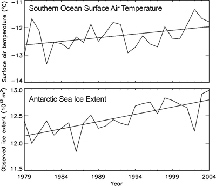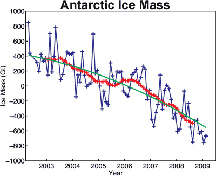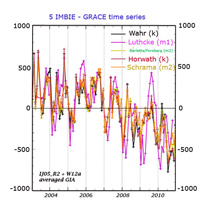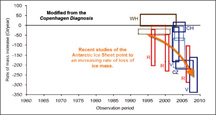Claim: Antarctica is GAINING ice, so even if there's ice loss in the Arctic, it's just natural variation as ice gains and losses come and go around the poles.
Why this Claim is Wrong. It's cherry picking again. The Southern Ocean consists of a layer of cold water near the surface and a layer of warmer water below. Water from the warmer layer rises up to the surface, melting sea ice. However, as air temperatures warm, the amount of rain and snowfall also increases. This freshens the surface waters, leading to a surface layer less dense than the saltier, warmer water below. The layers become more thermally stratified and mix less. Therefore less heat is transported upwards from the deeper, warmer waters. Hence less sea ice is melted (Zhang 2007). Meanwhile, the gold standard for total ice mass changes is the gravity measurements of the GRACE satellite system, which measures the total gravity of what is below it. As these satellites have crisscrossed the poles for fully a decade now, they tell an unambiguous story - ice is being lost at an accelerating rate from both the Arctic and the Antarctic continental masses. Will Antarctic ice loss continue at this rate? This is not obvious - Antarctica is a very high continent centered on the south pole and therefore surrounded by a powerful polar atmospheric cell which communicates little with the warmer air to the north (this is not true of Greenland, which is farther from the pole and has a different climate and communication outside the north atmospheric Polar Cell). As of the 2012 AGU meeting results (Rignot) , the glaciers are speeding up along the Antarctic coast, but the snowfall on the top of the continent is increasing, as warmer air can hold more water vapor. Year-to-year snowfall can change significantly over longer time scales than GRACE data exists. It is expected that Antarctica will show a secular, consistent net continental ice loss later in the 21st century, when global and regional temperatures rise further. Or, it's possible this has already begun, as shown by the GRACE data in hand, below.
Update 2014
New evidence shows the West Antarctic Ice Sheet is losing contact against the shallow ocean basin in which it sits, due to warm water intrusion. This end buttresses half a dozen glaciers which are now predicted to accelerate their melting, and that this ice loss alone will raise global sea level by 10 feet over coming decades (Rignot et al. 2014, discussed here)

Sea ice extent, observed by satellite (bottom). (Zhang 2007) It's the bottom graph that the denialists are trying to fool you with. Yes, Antarctic SEA ice extent has been increasing. But air temps are rising too. Note how the rising air temperature is still (so far) below freezing. |
|

Ice mass changes for the Antarctic ice sheet from April 2002 to February 2009. Unfiltered data are blue crosses. Data filtered for the seasonal dependence are red crosses. The best-fitting quadratic trend is shown as the green line (Velicogna 2009). |

Monthly changes in Antarctic ice mass, in gigatons, as measured by NASA’s GRACE satellites from 2003 to 2011. Results from five different IMBIE team members using different methods. The data have been adjusted to reflect new models of post-glacial rebound.
(Shepherd et al. 2012).
|
| In Short: It's another spectacularly false claim. Antarctica is currently net losing continental ice at an accelerating rate, as shown by the most reliable of data - the gravity-based GRACE satellite measurements. More warmth, more rain and snow, more stratified fresh water - is preventing warmer deeper ocean layers from melting sea ice so sea ice extent has so far been growing. Sea ice, of course, has no effect on sea levels, and when air temps rise further and get close to crossing the freezing point in the future, sea ice will be lost as well. We are seeing accelerating breakup of ice shelves in Antarctica, with no known way to stop the ultimate loss of the ~all of the West Antarctic Ice Sheet, the third largest reservoir of ice on Earth. |
Return to Climate Denial Claims List
Return to Climate Science Main Page



